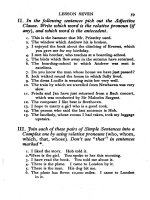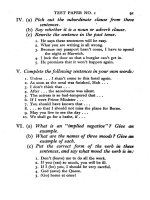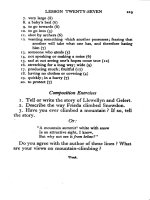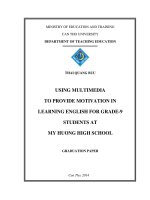Essential english for foreign students book 4
Bạn đang xem bản rút gọn của tài liệu. Xem và tải ngay bản đầy đủ của tài liệu tại đây (14.96 MB, 318 trang )
FOR FOREIGN STUDENTS
Book 4
BY CE. ECKERSLEY
KING’S COLLECE CHAPEL, CAMBRIDGE (see p. 220)
ESSENTIAL
ENGLISH |
or
Foreign Students
BOOK FOUR
revised edition
by
C. E. ECKERSLEY
FOREIGN LANGUAGES PRESS
Sofia, 1967
PREFACE
RevisEp Epitions of BooksI, II and III of Essential English have
already been produced; this present edition brings Book IV into
line with its three companion volumes. The book has been com-
pletely overhauled; those parts that the experience of teachers and
students had proved to be of interest and value have been
retained, the rest has been replaced by newer and, it is hoped,
more interesting, material. In this task I have had most generous
and valuable assistance from teachers and students in all parts of
the world, both in conversations that I have had with them and
in letters they have written to me. One thing that particularly
impressed me in these letters and conversations was the lively
interest that was shown in the “characters” of the book—
especially in Hob! I have therefore tried to tell something more
about them in this book; to revealthe my stery of Hob that has
aroused so much curiosity; to follow Jan’s romance; to see Olaf
and Pedro and Lucille leaving Mr. Priestley’s class and starting
out in life. The scene, too, has widened. Thanks to Hob’s some-
what unusual relatives we get something of the atmosphere of the
industrial north; with the aid of Olaf we visit Scotland, from
Pedro we hear about Cambridge and (a completely new depar-
ture) there is a leap across the Atlantic. In ‘‘ The American Scene”
Lucille records her lively impressions of life in America, and
Mr. Priestley, in addition to his talks on some of the more
picturesque events and outstanding figures in English history and
literature, touches also on the history and literature of America.
On the linguistic side, attention is paid to some of the points
of formal grammar not previously dealt with, e.g. the infinitive,
participles, gerunds, the complement, word order, etc. There is,
too, a full treatment of prepositions, and particular stress has been
laid on the usage of the chief phrasal verbs.
In this book, as in previous ones, copious exercises have been
provided with each lesson. Some of these, e.g. the ‘‘Compre-
hension Exercises”, have been modelled on the type of question
v
vì ; PREFACE
set in the Cambridge Lower Certificate examination and are at
about the same level of difficulty, so that the student who has
worked through this volume should find this work of assistance
in preparing for that examination.
C.E.E.
CONTENTS
Each lesson is followed by exercises based on it
LESSON PAGE
I FRIEDA AND JAN BREAK THE NEWS, VERB STUDY 1: look . I
2 SOME PERSONAL LETTERS. VERB STUDY 2: come. PRE- - II
POSITIONS I . . ` > ° .
Ah pf n CG INVITATIONS AND REQUESTS. VERB STUDY 3: fake . 19
FOOTBALL. . . . , : . . 30
THE SPECIAL FINITE must, have (got) to,amito .
THE FOOTBALL MATCH must, need, have to (continued)
VERB STUDY 4: do, make. . . . . 43
WORD STUDY: already, yet, still, VERB STUDY §: give.
PREPOSITIONS 2... . . . . 52
GREAT BRITONS 1: Charles Dickens 0). VERB STUDY 6:
turn, IDIOMATIC ENGLISH 1: hand. PREPOSITIONS 3 . 60
GREAT BRITONS 1: Charles Dickens (ii), rpromatic
ENGLISH 2: heart. PREPOSITIONS 4 . .
7T
ro DAVID AND THE WAITER (A play), VERB STUDY 7: get. 4
2
iz HOB TELLS THE LIFE-STORY OF A GREAT BRITON, VERB
92
STUDY 8: break . . ° - :
12 GREAT BRITONS 2: Oliver Cromwell. vers sTUDY g: bring 104
13 GREAT BRITONS 3: John Milton. vers sTuDY 10: run.
PREPOSITIONS 5 . . . . . 115
14 ““WANTED--MR. STUART`” (A play). VERB STUDY Ir: call,
PREPOSITIONS 6 . . . . oe 127
15 THE STORY OF HOB, VERB STUDY 12: say and tell, VERB
STUDY 13: go. . . . . 149
16 BONNIE PRINCE CHARLIE. VERB STUDY 14: see
17 THE DOUBLE POSSESSIVE, VERB STUDY 15: fall. PRE- 162
POSITIONS 7 . . . 176
18 ROGER’S FIRST DAY AT SCHOOL. IDIOMATIC ENGLISH 3:
comparisons, VERB STUDY 16: hold " 183
19 WORD ORDER 196
vil
Vill CONTENTS
LESSON PAGE
20 GREAT BRITONS 4: Florence Nightingale . . . 202°
21 IDIOMATIC ENGLISH 4: animal idioms. VERB STUDY 17:
pull, IDIOMATIC ENGLISH 5: colour idioms . . 212
22 CAMBRIDGE. VERB STUDY 18: put. THE NON-FINITES I:
The Infinitive; 2: The “Bare” Infinitive . . 220
23 GREAT BRITONS 5: Captain Scott. VERB STUDY IQ: set.
THE NON-FINITES 3: Participles .. . . . 232
24 THE AMERICAN SCENE I: A letter from Lucille. Extracts
from Lucille’s journal. THE NON-FINITES 4: The
Gerund . . . . . ch sa . 243
25 THE AMERICAN SCENE 2: Lucille’s journal (continued). —-
THE NON-FINITES §: Gerund and Infinitive . . 253
26 THE AMERICAN SCENE 3: Lucille’s journal (concluded).
THE NON-FINITES 6: Gerund or Infinitive ... 263
27 THE AMERICAN SCENE 4: The Greatest American. THE
COMPLEMENT. A speech anda poem. . . 297
28 GOOD-BYE . . . . . . . . 296
PRONUNCIATION VOCABULARY . . . . . 301
PRONUNCIATION GUIDE TO PROPER NAMES . . . 305
MAP OF PLACES MENTIONED IN Essential English BOOK IV 306
EXAMINATION PAPER . . . . . . 307
INDEX . . . . . . sa . . 309
LESSON 1
Readers of the earlier books of Essential English 1, 11, and III
will remember that the lessons are built round a little group of
characters, the teacher, Mr. Priestley and his wife, the students,
Lucille, Frieda, Olaf, Jan, Pedro and Hob. Book IV completes the
story of the students, and when this book closes we shall have
seen them all leaving Mr. Priestley and going out into the world.
At the end of Book III we saw that Frieda and Jan had fallen in
love with each other; so, naturally, Book IV opéns with the
announcement of their engagement.
Frieda and Jan Break the News
SCENE: MR. PRIESTLEY”S living-room
-'Characters—MIR. PRIESTLEY, MRs. PRIESTLEY,
FRIEDA, Jan
yan: Mr. Priestley, Mrs. Priestley, there’s something
I—we—want to tell you. Frieda and I are en-
gaged to be married.
MRS. PRIESTLEY: Oh, how nice!
MR. PRIESTLEY: Congratulations and best wishes!
FRIEDA and JAN: Thank you both very much.
FRIEDA: You are the first people we have told—except
for my parents.
JAN: Yes, I wrote to Frieda’s father a week ago, telling
him we wanted to get married and asking for his
permission.
2 ESSENTIAL ENGLISH |
_ FrieDA: And we had replies this morning; it’s all
right and they are very happy about it.
MRS, PRIESTLEY: Oh! I’m so glad.
JAN: You don’t look very surprised at the news.
MRS. PRIESTLEY: I’m not surprised—I’d expected it
for months'—but I’m very pleased indeed.
MR. PRIESTLEY: I might as well admit that it’s a com-
plete surprise to me—I never notice things even
when they are right under my nose—but I’m
really delighted at the news. I think you are very
lucky, Jan, to get such a girl as Frieda.
MRS. PRIESTLEY: And I think you are very fortunate,
Frieda, to get such a fine fellow as Jan. I hope
you will be very happy together.
MR. PRIESTLEY: Are you thinking of getting married
soon?
FRIEDA: Well, that’s one of the things we are not
agreed on. As you know, Jan is starting at
London University in October to study to
become a doctor. He wants us to get married at
once. I would rather wait for a year or two—at
any rate until Jan has taken his first examination.
JAN: But what’s the point of waiting?
FRIEDA: So that you can really work hard. Don’t you
think, Mr. Priestley, that he would think about
his work more if I wasn’t there?
JAN: But don’t you see that if we were not married I
should be thinking about you all the time and
wanting to be with you instead of working.
Whereas if we were married
1 You will probably remember her remarks to Mr. Priestley, Essential
_English, Book III, p. ôi.
LESSON ONE 3
FRIEDA: Do you hear that ? Once we are married he
won't think about me any more. That’s a fine
thing to hear from a man you have just become
engaged to.
JAN: Oh, Frieda, you know I didn’t mean that. only
meant
FRIEDA: But that’s not the only thing we don’t agree
on.
MR. PRIESTLEY (smiling): Dear me, this sounds ter-
~ rible. What is the further cause of disagreement?
FRIEDA: Well, I want to live in a house; Jan thinks we
ought to have a flat or rooms in a house.
jan: A friend told me of a smali flat in the centre of
London overlooking King’s Cross station that
will be vacant in October.
FRIEDA: But I don’t want to live in a smail fiat in the
centre of London. I’d much rather have a little
-house in the country looking out on fields, where
I can breathe fresh air and see trees and hear
birds singing.
JAN: But a flat-:is so much more convenient. We could
get some labour-saving devices that would save
you a lot of housework, and there are lots of little
restaurants néar King’ s Cross where we could
go out for something to eat in the evening so you
wouldn’t need to cook meals.
FRIEDA: But I want to cook meals. I’m really quite a
good cook, and I don’t mind doing housework.
I like it. Besides, I looked at the flat you are
talking about and I didn’t like the look of it at all.
JAN: I agree it wasn’t very attractive-looking, but the
rent was low.
4 ESS5ENTIAL ENGLISH
FRIEDA: You know, I don’t like the idea of paying
rent. My parents have paid rent on our house
for thirty years. I wish I had all the money they
have paid in rent. They’ve paid enough to buy
the house twice over and yet they don’t own a
single brick of it.
JAN: Yes, I agree. I should like to buy a house, but
~ we haven’t the money, at least not now; in four
or five years’ time it may be different. You see,
Mr. Priestley, it’s like this. My grandfather, my
mother’s father—he was a Scotsman—left me a
sum of money in his will, and some useless
property, a factory; but the money is in trust
until IT am twenty-five. I get the income from
it, and that has been enough to keep me and pay
for my classes; with a bit of a struggle, it will
just about keep us both—at least I hope so.
\ But we’ve no hope of buying a house—at least .
not for a time. So if we must pay rent, let’s pay
_ the least we can and have a flat.
FRIEDA: Oh dear, I do wish I could have a house all to
myself, with a garden where I can grow flowers
and lettuces and cabbages. I was so looking for-
ward to it. Isn’t there any way we could buy one?
MR. PRIESTLEY: I don’t want to look as if I was poking
my nose into what isn’t my business, but——-
-FRIEDA: Oh, we don’t mind; we’d welcome your
ideas, wouldn’ t we, Jan?
JAN: Yes, rather! But don’ t you agree with me, Mr.
Priestley, that it would be’ much better to be
married soon and live in a flat and not wait a
year or two as Frieda says.
LESSON ONE s
FRIEDA: Don’t you think it would be better to wait
until we can get a house and not live in a flat ?
Isn’t that what we ought to do?
MR. PRIESTLEY: Well, I’m not going to say what you
ought to do.
MRS, PRIESTLEY: Neither am I.
MR, PRIESTLEY: But I know what you will do.
MRS. PRIESTLEY: And so dol. -
MR. PRIESTLEY: You'll get married soon and not
wait.
JAN: Very good! '
MRS. PRIESTLEY: And you'll have a house and not a
flat or rooms. |
FRIEDA: Hurrah! That’s what I say.
MR. PRIESTLEY: Well, if that’s what’s going to happen
I should like to make a suggestion if I may.
JAN and FRIEDA: Oh yes; please do.
MR. PRIESTLEY: Well, you know you could buy a
house through a Building Society. You look
round, choose the house you want to buy and
then approach the Building Society. You put
down a proportion of the money—say ten per
cent—and pay off the rest at so much a month.
The monthly payments will not be much more
than a rent would be, and you will have the
- satisfaction of knowing that your payments, go
_ towards buying the house.
jan: Well, there’s probably something in that,
but—— _ . |
FRIEDA: Oh, Jan, it would be lovely. As a matter of
fact I’ve been looking round and I’ve already
seen the house I want.
6 ESSENTIAL ENGLISH
jan: What!
FRIEDA: Yes. You know that little cottage, Mrs.
Priestley, that you see from the back of your
garden?
MR. PRIESTLEY: What, the one in Darvell Lane,
“Rose Cottage” I think it is called ?
FRIEDA: That’s the one. I heard it was for sale so I
went round there at once. It has a comfortable
little sitting-room, a tiny but very nice dining-
room, a kitchen, three bedrooms and a bathroom.
There are roses round the front door and an
apple-tree in the garden.
MRS. PRIESTLEY: Frieda, it sounds perfect.
FRIEDA: It is. But what’s the use of it? Jan would
prefer to live in London overlooking King’s
Cross with millions of people all round
us.
JAN: Well, if it would make Frieda happy I don’t
mind living in a house in the country, and I’ m
. quite willing to dig the garden for her. .
_ FRIEDA: That’s the way to talk, darling. I certainly
would like it. I’ve saved a bit of money and that -
would help towards buying the furniture. We —
shouldn’t need very much for a start. I don’t
mind how simply we live. I would do all my
- own work and clean the house and cook the
meals. Oh, it would be lovely!
JAN: Yes, it certainly sounds very nice when you put
it like that, but all the money I have in the
world will only just keep us and pay for my
studies at the University. How much do they |
want for this house of yours?
LESSON ONE 7
FRIEDA: They are asking £3,800, but we might get it
for £3,600 or £3,650. We would have to put
down about £360 to £370.
yan: Sorry, Frieda. I wish I could do it but it just
can’t be done.
MR. PRIESTLEY: Look here, Jan; as I said, I don’t
want to poke my nose ‘into your affairs but I have
a bit of capital, £300 or £400 in the bank doing.
nothing, and I’d much rather lend it to you if
that would help you than have it there doing
nothing.
jan: Oh, Mr. Priestley, that’s very kind ot you, but
I couldn’t accept that from you.
MR. PRIESTLEY: Nonsense. You can pay me back easily
when you become a successful doctor——as I am
sure you will. So that’s settled. We'll say no
more about it now, but come to my study after-
wards and we'll talk it over together.. . . Bless
my soul, Frieda! What are you crying for?
FRIEDA: I’m—’m—not crying. I’m just happy, that’s
all.
VERB STUDY (1): look
In this book we shall consider a number of verbs
each of which can have a variety of meanings. This is
particularly the case when the verb is used with a
preposition or an adverb, e.g. go on working, give up
smoking, burst out crying, keep on trying, etc. Verbs
like this are sometimes called “ phrasal verbs’’. One
8 ESSENTIAL ENGLISH
of the aims of Lesson 1 was to illustrate the uses of
look You will find these examples there:
I looked at the flat. I was looking forward to having a house.
I don’t want to look as if I was poking my nose into what isn’t
my business. Look here, Jan. A house looking out on fields.
I don’t want to live in the centre of London and Jook over
King’s Cross, A part of London overlooking King’s Cross.
It has a small but pleasant-looking dining-room. You /ook
round and choose the house you want.
EXERCISES
I. Word Study: Use the following words, taken from —
Lesson 1, in sentences of your own:
engaged (use also engagement. What is an engagement ring ?)
Make sentences using engaged to, engaged in, engaged with;
congratulations (and the verb congratulate), admit (note two
meanings; use also admission), whereas, agreement (What is
the opposite ?), flat (two meanings), breathe (also breath;
note the difference in pronunciation), rent, brick, lettuce
(give the names of three other vegetables), suggestion (also
suggest), approach, proportion, dig, furniture (mention four
different articles of furniture), capital (make three sentences
using one of these phrases in each, ‘‘a capital letter”, “the
capital of England’”’, ‘‘capital in the bank”’).
IT. Use the following in sentences of your own:
look at; look for; look forward to; look after; look as if; look
like; look as though; look down on; look into; look someone
up; look on; onlooker; look something up; the look of; have
a look at.
II, Show the difference between look out and outlook ;
to look over and to overlook.
1 Further examples and explanations of this verb and all the other
verbs discussed are given in the Teacher's Book IV.
LESSON ONE sit 9
IV, Make sentences of your own, using want; should
like; would rather; it would be better; prefer;
I don’t mind; wish; I’m quite willing.
V. Use each of the following idioms in a sentence of
your own: :
to lead a person by the nose; to pay through the nose; as
plain as the nose on your face; to keep one’s nose to the
grindstone; to poke one’s nose into other people’s business;
can’t see beyond his own nose; to turn one’s nose up at.
VI, Explain:
1. “ Look before you leap.”
2. “‘ Lookers-on see most of the game.”
3. “Don’t look a gift horse in the mouth.”
VII. Write a short story to illustrate one of the proverbs
in Exercise VI.
VIIT, Describe: through a Building Society.
1. ‘‘Frieda’s house.”
2. How to buy a house
IX, Composition Exercises
1. Your ideal house.. or life in the town.”
2. “Life in the country in a house or a flat?
Which do you prefer ? disadvantages of each
3. Would you rather live
Discuss the advantages and
X. Study the pictures on p. 10 and rewrite the story
they tell.
2-1V
LESSON 2
Some Personal Letters
1
JAN TO FRIEDA’S PARENTS
This was the letter that Jan wrote:
Dear Proressor and Mrs. LANs, ;
I don’t knew whether this letter will come as a
surprise to you, for I think you must have seen during
the happy time I spent in your home last Christmas,
how very fond I was of Frieda. We have worked
together every day at Mr. Priestley’s, and for some
time now I have realised that the friendship and
affection that I have always had for her had turned to
love. I hardly dared to hope tliat Frieda felt the same
way towards me, but last night I told her of my love
and asked her to marry me, and to my great joy she
said Yes. I hope you will feel that she and I have
known each other long enough to be quite sure in
our own minds that we love each other and want,
more than anything else in the world, to be married.
‘It would make us both very happy to know that our
engagement would have your approval and blessing,
and so I am writing formally to ask for your consent.
ir
12 ESSENTIAL ENGLISH
I realise that there is very little that I can offer
Frieda materially. I have only a small private income
on which to live until I qualify as a.doctor, but Frieda
is quite confident that under her careful management
we can have a comfortable little home on it. For my
part, I will devote my life to ensuring that she will
be as happy as all my love can make her.
My best wishes to you both.
Yours sincerely,
JAN SOLSKI, |
II
PROFESSOR LANG TO JAN
My DEAR JAN,
My wife and I are both very happy at the thought
that you and Frieda want to be married. Thank you
for writing to us as you did. Let me say at once that
we both gladly give our consent and blessing to your
engagement. Though we have only met you once
when you came here for a short time last Christmas,
we all grew very fond of you during that time, and
Frieda s letters home have been so full of you that
- we both feel as if we had known you for years. The
dearest wish of us all is for Frieda’s happiness, and
her letter to her mother today leaves us in no doubt
about that or the cause of her happiness.
Thank you, too, for being so frank about your
financial position. I have no doubt that life will not
be easy at first for Frieda and you and it may be
difficult at times to make ends meet on your small
LESSON TWO - 13
income. But when love is there, the struggle will only
draw you closer together. I believe the English have
a saying, ““ When poverty comes in at the door, love
flies out at the window.” Don’t believe it! When my
wife and I were married, my income was probably
smaller than yours and we have never been rich, but
I know, beyond any doubt, that that English saying
is not true, and I am sure you will find the same.
We are all longing to see you both soon—and that
may be earlier than you think, but I’m leaving that
news to my wife who is writing today to Frieda, so
I will merely say now, ‘‘ Congratulations and bless
you both.”
Yours sincerely,
JOHANN LaNc,
1H
MRS. LANG TO FRIEDA
MY DARLING FRIEDA,
Your letter to me and Jan’s to your father have
made us both very happy. There is no one we would
rather have for a son-in-law than Jan and we are both
delighted to welcome to our family someone of whom
we are both so fond, and I am sure this is one occa-
sion when the old saying about “ not losing a daughter
but gaining a son” is the simple truth. Our hope and
prayer is that you may both continue through life
always as happy as you are now. We are all longing to
see you both again soon—and now comes my great
news. Today your father received an invitation to
come to Oxbridge University for a year to give a









